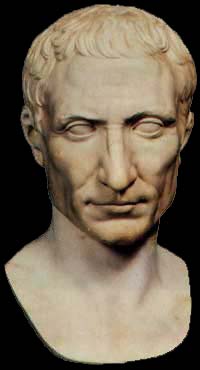 AMY GOODMAN: Who was Julius Caesar, Michael Parenti?
AMY GOODMAN: Who was Julius Caesar, Michael Parenti?
MICHAEL PARENTI: Julius Caesar was an aristocrat who sided with the Roman people. He's not my hero, but he was one of a long line of what we'll call populare's, which were popular leaders who tried to institute these reforms that the people were fighting for. The Gracchi brothers, Claudius and others. Caesar was the last. All of them were assassinated. That's the way ruling classes work. If the elections don’t go their way, they will just assassinate the winner and escalate. We see the same things happening in Haiti today.
AMY GOODMAN: How was Julius Caesar assassinated?
MICHAEL PARENTI: He was assassinated by Brutus and Cassius, who were not very nice people; I examine them further. Brutus was a ruthless money lender who charged 45% interest, destroyed a whole community that couldn't meet its debts, and extorted money from others. They killed Caesar because he was making these kinds of reforms: Imposing luxury taxes on the filthy rich, demanding that they use at least one-third of their labor force to be free labor, instead of slave labor. Trying to roll back slave labor and use free labor. He was doing things like this, and any ruling class in history, when it's faced with reforms, defines these reforms as thievery and dangerous leveling, and sees them as undermining society. And they will go after the reformer, usually by demonizing him/her, calling him/her power hungry, usurper, this, that, and eventually resorting to acts of violence to settle the issue. May I also say that Rome is just fascinating on its own terms. Not just the parallels to today. These people were interesting to deal with…
AMY GOODMAN: Why did you write a book today, at this period which you consider extremely grave, write a book on ancient Rome?
MICHAEL PARENTI: It's a fascinating time, and it's very relevant. It's about the very same kind of struggle. John Edwards talks about the two Americas, you could talk about the two Rome’s. It was the same thing. What has come down to us in history is a view of ancient Rome that is totally indebted to the roman ruling class. Most historians today accept the view of Rome that the assassins had, the view of the rich aristocracy, which was to denounce any reformer as a demagogue, and to denounce the agitations of the people as the expressions of a mob and a rabble. And my investigation shows that the roman people weren't a mob or a rabble. They were masons and carpenters, construction workers and dockers, teamsters and shopkeepers—all sorts of hard working people fighting for things like overthrowing a Kingship, instituting a republic, calling for debt cancellations against usury, calling for decent rents, rent and land controls, and land redistribution... Issues that are very much alive today. So it would be a good journey through time to see these same kinds of very vital issues.
From a discussion between Michael Parenti and Amy Goodman on Democracy Now, Feb. 4 2004.
Full transcript of this interview—MP3—OGG
Also
The Assassination of Julius Caesar: A People’s History of Ancient Rome
1 hour video interview with Michael Parenti on C-SPAN Booknotes
Image from wikipedia.